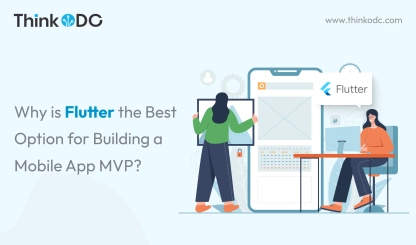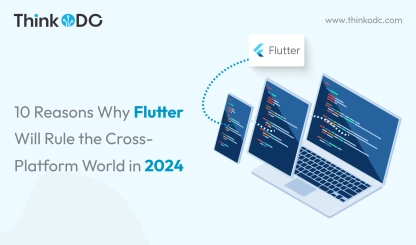If you are here, you might be looking to create a Healthcare app for your business. However, you're unsure of which technology will work best for your healthcare initiative. After all, there are so many of them available in the market.
But, you likely have a few options in mind, including Flutter.
Flutter is one of the best cross-platform mobile app development frameworks out there. According to a 2022 report by Statista, Flutter surpassed React Native to become the most popular cross-platform mobile framework.

With its native performance, customizable UI, and speedy development cycles, Flutter enables you to deliver secure, stable healthcare apps to patients accurately and efficiently.
However, you may still be unsure whether Flutter is truly worth counting on for such a critical business initiative. That's what this blog aims to uncover today! But before we do that, let's learn about the landscape of healthcare apps and the challenges of choosing the right technology:
The evolving landscape of healthcare apps
The demand for specialized healthcare apps has positively exploded in recent years.
Get this - the global mHealth market was valued at USD 63.5 billion in 2023 and is expected to increase at a compound annual growth rate (CAGR) of 10.7% from 2024 to 2030. Driving this surge is the rising adoption of medical apps by both patients and providers.

Today, consumers want their healthcare needs met on the go - be it doctor discovery, symptom analysis or medication reminders. Healthcare mobile apps bring convenience right into their palms, anytime and anywhere. Meanwhile, big hospital systems and insurers are investing heavily in virtual care platforms and patient engagement solutions.
Throughout and after the pandemic we saw an acceleration where apps became the preferred self-service channel enabling individuals to manage their health needs seamlessly.
Some hugely popular examples of healthcare apps gaining user traction today cover:
- Automated symptom checker and triage chatbots to offer initial medical advice virtually.
- Chronic care management platforms with features facilitating disease monitoring.
- Medication reminder and pill tracking apps ensure treatment plan adherence.
- Online doctor appointment booking solutions for hassle-free visits.
- Wearable device integration for real-time monitoring of vitals.
As healthcare apps host sensitive user information, it is non-negotiable for developers to build clinical-grade, HIPAA-compliant solutions users can place their trust. The user experience fluidity combined with the reliability of data security and privacy protections is what sets leading healthcare apps apart.
Challenges in choosing the right tech stack for healthcare apps
As you can see, the healthcare sector is on the rise, and developing a healthcare app for your business now can be both profitable and beneficial. But, there is one critical thing you need to take care of before starting your new endeavor.
And that is “pick the right technology”
With a lot of sensitive data, strict regulations, and a wide range of user requirements, you need a tech stack for your healthcare app that is dependable, secure, and efficient.
That, believe it or not, is the most difficult part of all, and it can make or break your app’s success.
Here are some of the challenges you may face when selecting the right technology for your healthcare application:

Platform compatibility
Patients access healthcare apps on both Android and iOS—an app's tech stack must work flawlessly across operating systems. Fragmented solutions only functioning on specific platforms restrict an app's ability to serve all users equally.
What you need is flexibility.
A solution delivering native speed, fluidity and functionality regardless of device. Your app experience can't be compromised simply because a patient owns an iPhone versus an Android. Tech limitations shouldn't curb an app's reach and impact. Choose cross-platform capabilities that allow serving users awesomely on whichever device they carry.
Performance and stability
Healthcare applications handle sensitive data, real-time interactions, and complex functions. Any lags, crashes, or technical issues can negatively impact not only user experience but also put critical information at risk.
Stability and robust performance are baseline requirements for healthcare applications, necessitating technology stacks optimized for speed and reliability.
Development speed and cost
Along the same lines, some technology options require large development teams and extensive resources to build full-featured apps. With the budget limitations many healthcare startups and companies face, finding reusable components can make a massive impact on both cost and time-to-market.
Opting for a popular framework with an active open-source ecosystem helps you launch your project faster without inflating budgets.
Security and compliance
Patient health data requires rigorous security protocols and regulatory compliance. Encryption and access controls that safeguard sensitive information remain non-negotiable when evaluating technologies.
Any framework unable to guarantee compliance or lacking robust privacy protections has no place powering healthcare apps.
These challenges illustrate the delicate balance healthcare app developers must navigate.
Thankfully, Flutter emerges as a game-changer, offering a solution that tackles these obstacles head-on.
In the next section, we'll discover how Flutter's unique capabilities unlock a new era of secure, performant, and efficient healthcare app development.
Read More: Find out why develop a fitness tracking mobile application with Flutter
Why Flutter makes the perfect match for your next healthcare app
Flutter checks all the boxes needed to build secure, high-performance healthcare apps tailored to the platforms your users prefer.
Here are some reasons why you should choose Flutter for healthcare apps:

Cross-platform development
A key advantage Flutter offers is cross-platform development, enabling the creation of beautiful iOS and Android apps from a single codebase without compromising features or performance. This eliminates the extra cost and effort of building native apps separately for iOS and Android.
For healthcare app developers focused on reaching the maximum number of patients, Flutter’s platform-agnostic nature provides invaluable inclusivity.
Whether it’s a medication reminder app, virtual therapy session, or chronic condition management platform, Flutter ensures the app functions smoothly across both mobile ecosystems.
High-performance and native rendering
Healthcare apps handle private data and real-time use. Bugs or laggy performance can severely impact user trust.
Flutter meets these demands with exceptional speed and a native look and feel. Its built-in Skia rendering generates flawless animations and instant responses. This enables smooth navigation and hassle-free data entry which are essential for healthcare apps.
Fast, reliable performance also allows real-time data syncing so doctors and patients access up-to-date information.
By delivering on both speed and user experience, Flutter fosters confidence even in non-tech-savvy users. The result is next-generation apps as refined and accessible as traditional health tools.
Rich widgets and customizable UI
Flutter liberates healthcare app design from the constraints of sterile, generic interfaces. Its expansive widget library and customizable UI deliver creative freedom.
It gives Flutter developers the tools to build visually rich apps full of irresistible features. These compelling designs invite greater user engagement. Interactive graphs allow patients to explore health trends.
Intuitive trackers empower them to log medications, symptoms, moods, and more. Personalized dashboards display digestible health data alongside customized fitness plans, medication schedules, real-time symptom reporting, and tailored reminders for each individual’s health journey.
With infinite variability and aesthetic appeal, Flutter helps develop the next generation of healthcare apps where design and function beautifully intertwine.
Rapid development and cost-effectiveness
In the competitive healthcare landscape, saving time and money is imperative when building apps.
Flutter’s “hot reload” ability accelerates coding tremendously via instant visual feedback. Flutter app developers see UI changes applied on the fly without waiting for builds or restarting apps.
Additionally, Flutter’s intuitive Dart language needs less code than alternatives like Java or Kotlin. Together these advancements enable rapid prototypes and iterations.
Coupled with Flutter’s reusable widget library, they massively boost productivity over traditional mobile tools. Streamlined processes plus optimized reuse of elements equals faster launch timelines and huge cost savings.
Resources get redirected from tedious coding to perfecting app functionalities and elevating the end-user healthcare experience.
Security and compliance
When it comes to healthcare apps, data security is not optional; it's an absolute necessity. Thankfully, Flutter prioritizes user security with built-in encryption, data access control mechanisms, and secure networking protocols.
Additionally, Flutter apps fully comply with strict healthcare regulations like HIPAA, ensuring the privacy and protection of sensitive patient information. This commitment to security builds trust with users, healthcare providers, and regulatory bodies, paving the way for wider adoption and impactful healthcare solutions.
Flutter strikes the perfect balance of capabilities for healthcare apps. Its singular codebase reaches all key platforms while upholding performance and security. Intuitive custom designs foster user adoption and engagement.
Rapid development translates to faster launch timelines and cost savings. These strengths synergize into a framework uniquely suited for innovating impactful health solutions.
It gives healthcare providers and Flutter developers an agile launchpad to conceive ideas becoming reality in record time. It paves the way for the next generation of apps that truly reform how people manage wellbeing.
Conclusion
With its unbeatable combination of cross-platform capabilities, native performance, UI flexibility, speedy development, affordability and security compliance, Flutter simply can’t be beat.
As healthcare apps continue to boom, now is the perfect time to get a head start building with Flutter. You can rapidly create beautiful, secure and reliable apps that will delight users across iOS, Android and the web without the traditional hassles.
Now, if you are convinced Flutter is the right technology for your next healthcare app, the next logical step is to hire expert Flutter developers.
But where do you find them?
When it comes to finding expert Flutter app developers for your healthcare app, look no further than ThinkODC.
Our strong Flutter dev squad brings together deep healthcare domain experience, robust security compliance, and proven execution excellence across global mHealth projects.
ThinkODC’s Flutter developers offer full-spectrum support - from user research and HIPAA-grade data security to seamless UI/UX design to rapid Flutter development and deployment.
With ThinkODC as your go-to Flutter innovation partner, you can translate your ambitious visions into a secure, high-performing app that drives outcomes.





